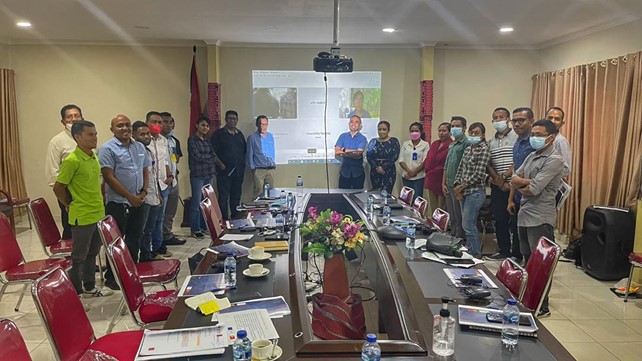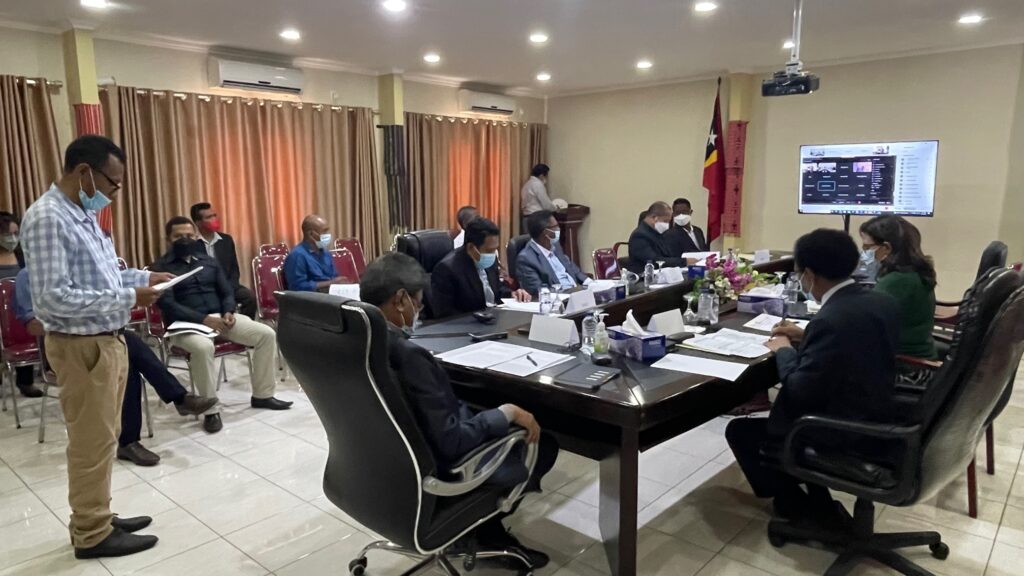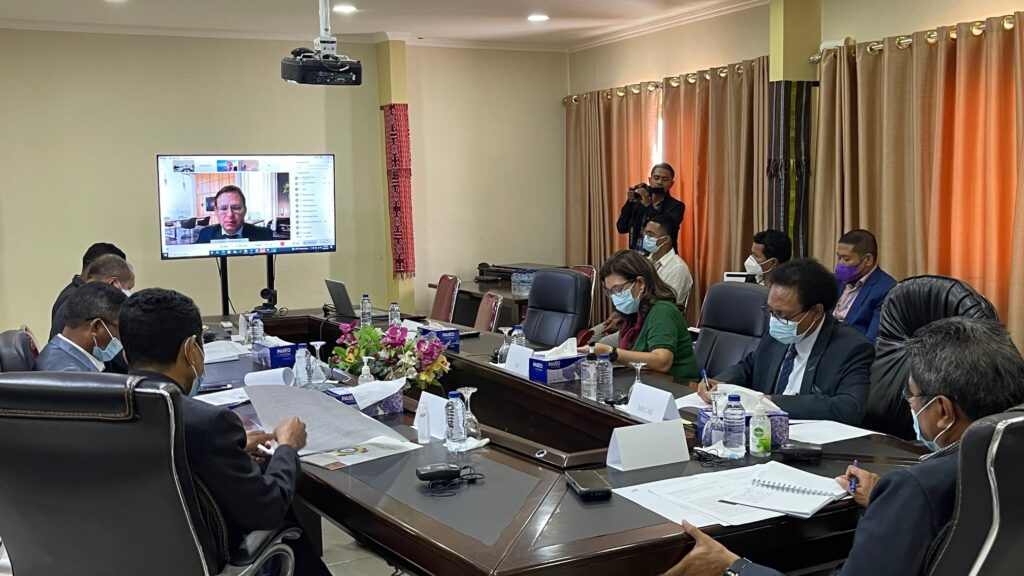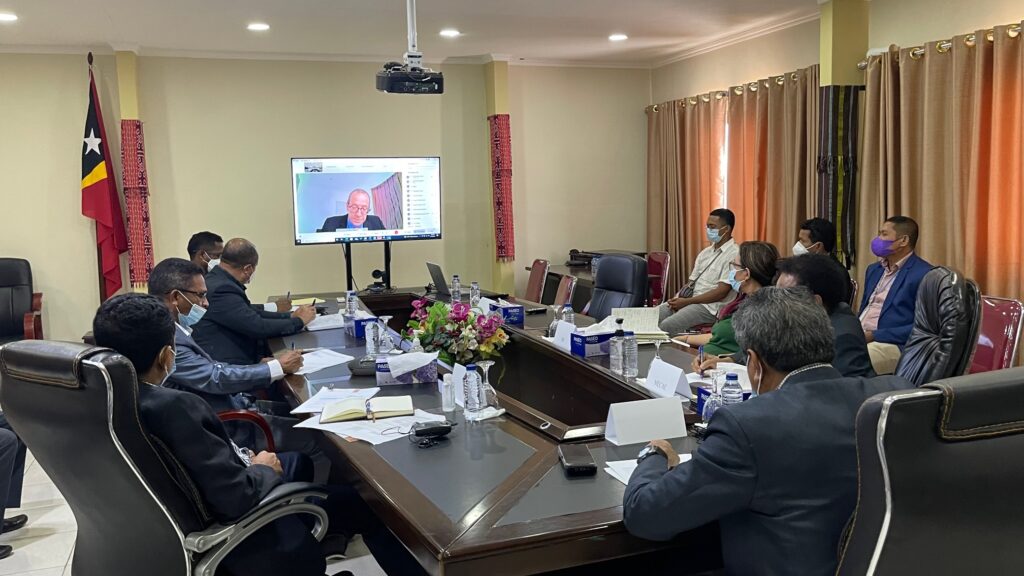Author: FCCNX
EIB consultants discuss water and sanitation projects with BTL Executive President
SWM Innovation Workshop
The SWM Innovation Workshop presented successful projects in the solid waste sector, including the utilization of Black Soldier Fly Larvae for organic waste management, and deposit return systems for Timor-Leste.
On 23 February, more than 25 participants representing various stakeholders (e.g., ANAS, DMA, NDA, BTL, E.P., MPO, MSA, NAO) participated in a workshop showing experience from international projects in the solid waste sector.

After an introduction of Mr. Jan Drozdz, PPIP Team Leader, and opening remarks by Mr Kassius Klei, MPO Focal Point for the PPIP, Mr Jan Skajaa, COWI Waste Expert, presented the key features of sanitary landfilling. The presentation focused on the differences between random dumping in uncontrolled dumpsites and depositing waste in engineered landfills, designed for the purpose. Such landfills will for example be equipped with systems for extracting gas from the waste, suitable for utilization as fuel thus reducing greenhouse gas emissions.
The second session by Ms Sekti Mulatsih, Waste Expert from Indonesia, presented an on-going project on biowaste processing using Black Soldier Fly (BSF) larvae in Indonesia. Biowaste processing using BSF Larvae may be an option for rural areas in Timor-Leste as it is easy to manage. The products of the process are fish or chicken fodder, and organic fertilizer.
Following this, a proposal for a deposit return system (buy-back systems) for beverage containers and other recyclables for Timor-Leste was introduced. Such system will be building on the private sector’s participation and motivation and mutual interest. Experience show that very high return rates and thus high degree of recycling can be achieved along with other positive effects. A deposit return system can complement other recycling programs, extend the usable lifetime of the landfill and most importantly, enhance public health and prevent pollution in general.
The Project Preparation and Implementation Programme (PPIP)[1], supported by the European Union and the European Investment Bank, aims to support the identification, preparation, and implementation of technically, financially, economically, environmentally, and socially sound investment projects in the forestry, solid waste, and water and sanitation sectors.
For more information please contact:
Mr Jan Drozdz, PPIP Team Leader, jadrx(at)cowi.com
Mr Kong Kiong Um, PPIP Project Coordinator, kkmux(at)cowi.com
[1] The Project Preparation and Implementation Programme for Timor-Leste is an EIB executed technical assistance operation which is financed from the European Development Fund, under the Investment Facility for the Pacific (IFP) and under the Cotonou Agreement.
Second Project Steering Committee Meeting
10th February 2022: Today, the Second Project Steering Committee (PSC) meeting of the European Investment Bank (EIB) funded Project Preparation and Implementation Programme (PPIP)[1] was held at the Ministry of Planning and Territory.

The Second PSC meeting was represented by several Government Ministers, representatives from the European Union Delegation (EUD), the European Investment Bank (EIB), the project consultant COWI and was chaired by H.E. Eng. Joaquim Amaral, Coordinating Minister of Economic Affairs. The meeting was opened by His Excellency the Vice Prime Minister and Minister of Planning and Territory, Eng Jose Maria dos Reis who mentioned the following “I thank the European Investment Bank for its assistance and commitment to support projects focused on green activities or environment, through the development of response and capacity building, by mitigating negative impacts through climate change in the means of adaptation and mitigation of technology, human resources and financial sources. We believe that through the cooperation and technical assistance from the European Investment Bank, we can obtain the result and information which are credible”.
The Second PSC meeting agreed that the following project fiches be recommended for prefeasibility studies being: Water Sector -two cluster of cities of Aileu, Gleno and Liquica; Maliana, Suai and Ainaro. Solid Waste Management – Integrated solid waste management; Healthcare risk waste management. Forestry – Expanding commercial tree and other crops; Catchment(s) management in the watersheds of Irabere and Mota Loes.

The Head of Asia and Pacific Division, European Investment Bank, Mr Edvardas Bumsteinas commented that “the project identification stage has taken eight months to complete from the inception stage. The process has been consultative and PPIP, COWI and the Government of Timor Leste have met regularly to discuss the merits of each project. EIB is the European Climate Bank and thus climate and environment are very important factors in the identification of suitable projects. We are pleased that the GoTL has selected the 6 fiches being 2 per sector, to go onto the next prefeasibility stage. The next steps are for these 6 prefeasibility studies to translate into at least 3 feasibilities studies. Then hopefully these feasibilities could become loans from the EIB to the Govt of TL. We are more than hopeful that EIB will be able to have a fruitful relationship with the GoTL in the identification, analysis and development of many more infrastructure projects in Timor Leste. EIB is one of the largest multisectoral financial institutions in the world, and hopes to have an increasing presence in TL. We thank the GoTL and the project consultant COWI in striving to meet project deadlines even in light of the difficulties of the Covid 19 pandemic.

The Ambassador of the European Union to Timor-Leste, Mr Andrew Jacobs, mentioned that this project is coherent with the EU’s Indo-Pacific Strategy, through which the EU seeks to strengthen its partnership with the region. It sees particular opportunities in green transition, sustainability and inclusive prosperity, ocean governance, digital governance and partnership, connectivity, security and defence, and human security. This steering committee is important and will allow priority projects to be defined for investment. This is part of an extensive and meticulous process that I hope will lead to significant interventions by the EIB in support of Timor-Leste’s sustainable development ambitions.
The meeting was attended by H.E. Mr. José Maria dos Reis, Vice Prime Minister and Minister of Ministry of Planning and Territory; H.E. Mr Joaquim Amaral, Coordinating Minister of Economic Affairs; H.E. Mr. Miguel Pereira de Carvalho, Minister of State Administration; H.E. Ms. Sara Lobo Brites, Acting Minister of Finance; H.E. Mr Pedro dos Reis, Minister of Agriculture and Fisheries; H.E. Mr Andrew Jacobs, Ambassador of the EUD to Timor-Leste; Mr Edvardas Bumsteinas, Head of Asia and Pacific Division EIB; as well as other representatives from the Government of Timor- Leste, the EIB, the EU, and the PPIP Consultant COWI.
About the PPIP
The PPIP is an EIB funded project to assist the Government of Timor-Leste in the identification, preparation and implementation of technically, financially, economically, environmentally, and socially sound investment projects in three sectors of Water Supply, Sanitation and Drainage; Solid Waste Management and Forestry. PPIP will identify potential fiches in the three sectors, conduct prefeasibility studies for six projects (two per sector) and then complete three feasibility studies (one per sector). At the end of the feasibility studies, it is envisaged that the Government of Timor Leste will take out loans from EIB to fund the three investment projects.
About the project Steering Committee of PPI Programme
The Project Steering Committee of the PPIP is co-chaired by the Ministry of Planning and Territory, the Ministry of Finance, and the European Investment Bank. The Government of Timor-Leste is also represented in the PSC by the Ministry of Foreign Affairs and Cooperation, the Ministry of State Administration, Bee Timor-Leste, and the Ministry of Agriculture and Fisheries.
About the European Union
The European Union (EU) is a unique economic and political union between 27 European countries that, together, cover much of the continent. The predecessor of the EU – The European Coal and Steel Community – was created in the aftermath of the Second World War and was built on the understanding that countries that trade with one another become economically interdependent and therefore more likely to avoid conflict. In Timor-Leste the EU is the second largest donor of development aid (grant funding). The EU is committed to support Timor-Leste 2011-2030 Strategic Development plan, which aims to transform Timor-Leste into an upper-middle-income country by 2030 based on rapid, inclusive growth enabling it to improve infrastructure, worker skills, education, training and health systems, and combat poverty and malnutrition. The EU assistance focuses on green and sustainable economic recovery and development, rural development, good governance for sustainable development and gender equality.
For more information please contact:
Mr Jan Drozdz, PPIP Team Leader
[1] The Project Preparation and Implementation Programme for Timor-Leste is an EIB executed technical assistance operation which is financed from the European Development Fund, under the Investment Facility for the Pacific (IFP) and under the Cotonou Agreement.

